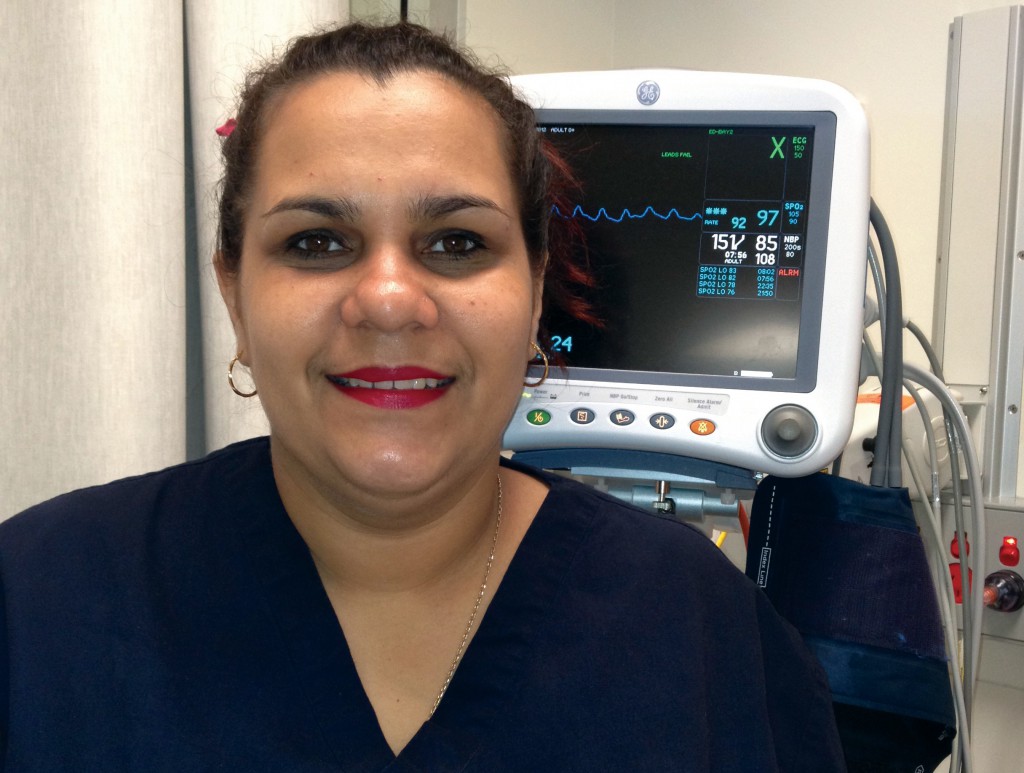
Emily Hunter’s significant contribution to Aboriginal healthcare in the Kimberley has made the Notre Dame Nursing graduate a well respected community member in the eyes of her patients.
Ms Hunter said she was “very proud” of being recognised as an Aboriginal Registered Nurse in her local community and would like to encourage more nurses and healthcare professionals to consider working in rural and remote Western Australia.
After graduating from The University of Notre Dame Australia’s Broome Campus in 2004, Ms Hunter completed her graduate program at Broome Hospital where she is currently employed as a Registered Nurse.
She divides her time between the emergency department and triage which puts her in close contact with nearly all of Broome’s inbound and outbound patients.
Over the past eight years at Broome Hospital, Ms Hunter has applied her clinical knowledge to many areas including the general ward, theatre, day surgery, paediatric ward, outpatients, infection control and the medical imaging department.
Despite the challenges of working in a regional location, Ms Hunter says she thoroughly enjoys her role and takes pride in delivering quality healthcare.
“I think the best part about working in country health is the initial help you give someone as well as the hands-on nature of the job,” Ms Hunter said.
“Being an Aboriginal woman and having lived in the Kimberley my whole life, I’m known to many of our patients who can relate to me and place their trust in me to look after them.
“Having witnessed the lack of quality healthcare present in many Aboriginal communities throughout my childhood, I felt compelled to enter into a career where I could assist in providing these essential services to Aboriginal people.”
Ms Hunter, a mother of three, first enrolled in a Bachelor of Education at Notre Dame’s Broome Campus to seek a career in primary school teaching after working as a bookkeeper for several years.
However, she said something inside her told her to follow in her father’s footsteps and enter the field of Aboriginal healthcare.
Ms Hunter’s father, Dr Arnold ‘Puggy’ Hunter, was the Chair of the National Aboriginal Community Controlled Health Organisation and an adviser to the House of Representatives Standing Committee on Family and Community Affairs and its inquiry into Indigenous health.
For his significant contribution to Aboriginal and Torres Strait Islander health, he received an honorary doctorate from James Cook University and has an Australian Government-funded scholarship, the Puggy Hunter Memorial Scholarship, named in his honour which assists Indigenous undergraduate students studying health-related disciplines.
Ms Hunter said the support she received from her family gave her the values of compassion, respect and tolerance. She also acquired extensive local knowledge and vital communication skills from her family, which are important in her role.
“My parents always expressed to us the value of education and they were extremely supportive of me and my career goals,” Ms Hunter said.
“As with anything in life, to achieve success you need to put in the hard work. With Notre Dame offering the Bachelor of Nursing program on its Broome Campus, there’s more opportunity for students in the Kimberley to study this course and work in an extremely rewarding area.
“The support I had from the Broome community and people from the Kimberley region was priceless and really enhanced my learning experience at Notre Dame.”
– Thinking of studying Nursing at Notre Dame’s Broome Campus? For course information and contact details, please visit http://www.nd.edu.au/broome/courses or call the Prospective Students Office on (08) 9433 0555.